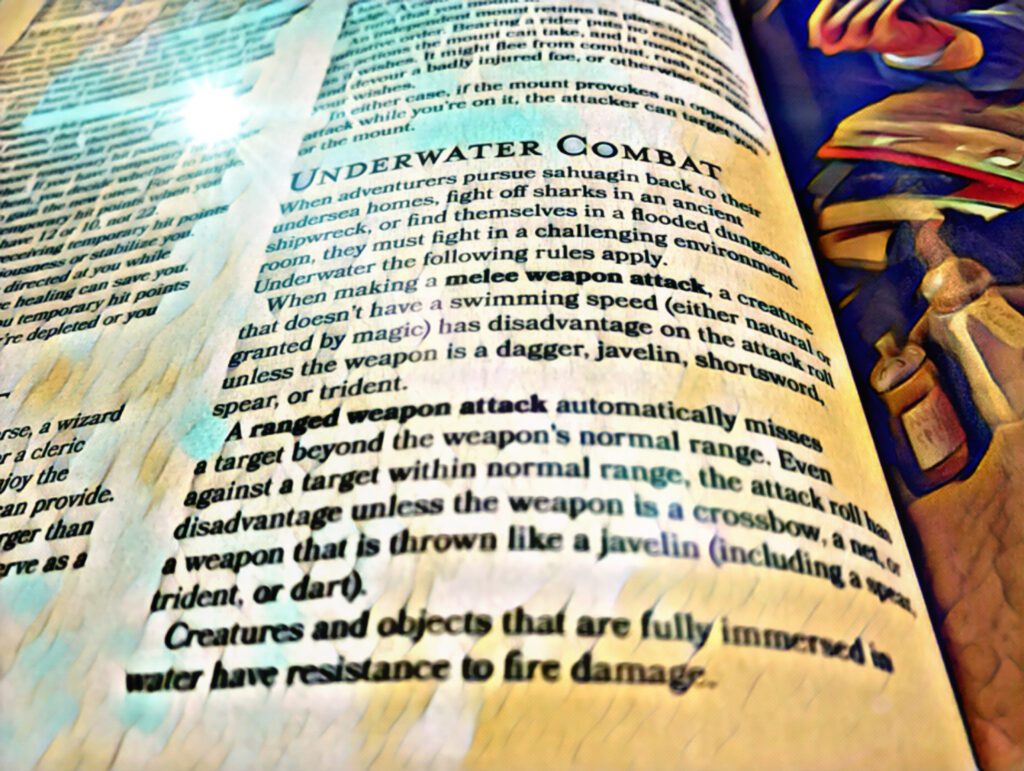I’ve been trying to avoid needing to know how to run underwater combat in 5e for months. But my pirates in Ghosts of Saltmarsh are finally getting sick of shore leave. My druid has been making potions of underwater breathing for months – in anticipation of some day getting under the waves. Heck, Gunther (the druid) has wanted to collect specimens of poisonous sea creatures since he first gave me his back story.
Gunther and his pals need to go swimming. I need to learn how to run underwater combat. Off to the rules I go …
According to RAW
The first place I went to learn the rules as written (RAW) for underwater combat in 5e was the Player’s Handbook. It is there, on page 198. But there are only four paragraphs, with only three “rules” things to keep in mind:
- Melee weapon attacks
- No swimming speed = disadvantage on the attack role
- Exceptions (no disadvantage)
- dagger
- javelin
- shortsword
- spear
- trident
- Ranged weapon attacks
- Beyond weapon’s normal range = automatically misses
- Within weapon’s normal range
- Disadvantage on attack roll (exceptions noted)
- Exceptions (no disadvantage)
- crossbow
- net
- any weapon throw like a javelin (spear, trident, dart, etc.)
- Resistance to fire damage (if fully immersed)

Image by Carla Bumstead/WOTC
That’s Ridiculous
Well, I’m not satisfied with that RAW lesson. What about the underwater part? In a real-life situation, having to hold your breath, swim and put yourself in the right position to fight a specific target would be a lot harder. Right?
Apparently not.
Swimming
The Dungeon Master’s Guide does shed a little more light on the situation, but not much. On page 116, under “unusual encounters,” we get something on swimming and underwater visibility. To be honest, it’s basically useless for what I need. They are going to jump in the water, fight and then get back on their boat. I don’t need a section detailing how long and far you can swim without suffering exhaustion? I need to know how long they can breath underwater without some kind of magic. Unless they are sea elves. Which they are not.
Holding Your Breath Underwater
Back to the PHB I go. But it’s not where it should be (under Combat.) Instead, it’s in the Adventuring chapter, under Environment, under the subheading “Suffocating.”
There, the DMG says:
A creature can hold its breath for a number of minutes equal to 1 + its Constitution modifier (minimum of 30 seconds). When a creature runs out of breath or is choking, it can survive for a number of rounds equal to its Constitution modifier (minimum of 1 round). At the start of its next turn, it drops to 0 hit points and is dying, and it can’t regain hit points or be stabilized until it can breathe again.
– Dungeons Masters Guide, page 183

Image by Carla Bumstead/WOTC
Too Easy – Underwater Combat in 5e
For example, in my Ghosts of Saltmarsh game, my rogue’s Constitution is 14, with a modifier of +2. So she can hold her breath for 3 minutes. As a round of combat in 5e is assumed to last 6 seconds, that means she can go 30 rounds in combat before starting to “suffocate” (i.e., drown). She then has 2 more rounds of combat to get to the surface for air.
Say what?
This means, Salome the Rogue – who grew up in the forest and has never been swimming in her life – can hop in the ocean with her crossbow and go after a shark with no disadvantage whatsoever, except for her movement speed being halved. True, she only has 30 rounds to take this dude out. But she can be comforted by the fact that, if someone hurls a fireball at her, she’s only going to talk half the damage.
Fire should do no damage whatsoever in water – unless you are swimming in an oil slick.
I got this
Long story short – I have been needlessly worrying about running underwater combat in 5e for far too long. My Ghosts of Saltmarsh players could have had all kinds of underwater fun by now. I should never have assumed the rules would make sense. So off I go then, to double the number of sharks that will be waiting for them on Monday.

(Photo by Sebastian Pena Lambarri on Unsplash)
But how do I break the news to Gunter? All those potions of underwater breathing he has spent so much time and money on? He might want to give them to the sharks.





